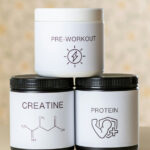Ridges, Bumps, Or White Spots On Your Fingernails? What Your Nails Say About Your Health

Fingernails are fascinating. On any given day, they scratch our itches, peel our stickers, pick our teeth, and protect our fingers.
But, did you know that the color, texture, and resilience of your fingernails can reveal important indicators about your overall health?
In this post:
- What are fingernails made of?
- Fingernails: What’s Normal and What’s Not
- What’s Normal: Signs of Healthy Fingernails
- What’s Not Normal: Signs of Unhealthy Fingernails
- How to Improve the Health of Your Fingernails (and Body!)
Ridges, ripples, bumps, and spots in your nails can reveal problems in your liver, lungs, and even your heart.
If you pay attention to these warning signals, your hands can be the canary in the mine, alerting you to problems before they get worse.
You just need to know what you’re looking for.
What Are Fingernails Made of?
Your fingernails are made up of layers of keratin, a protein also found in your skin and hair. It’s no coincidence that strong, healthy nails usually go hand in hand with strong, healthy hair and skin.
Like the rest of our body’s bones and tissues, our hair, skin, and nails are nourished best by plentiful, bioavailable minerals. They’re also often one of the first red flags when something has gone awry, healthwise, or when important minerals are in scarce supply.
Healthy fingernails vary in color, size, and shape. However, in general, your nails should be shiny, free of horizontal ridges, grow quickly, and resist breaking and bending.
Fingernails: What’s Normal and What’s Not
Fingernails can tell you a lot about your health. But first, you need to know what’s normal—and what’s not.
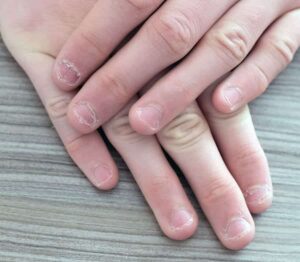
We’re going to start with the normal category here. Because, often, people get caught up worrying about a couple of fingernail features that are (usually) totally normal.
What’s Normal: Signs of Healthy Fingernails
For the most part, there’s no need to worry if your fingernails have these qualities. However, like most health issues, your radar should go up if they come on suddenly or dramatically.
- Small White Spots On Nails. There’s a pervasive myth that small white marks on nails are signs of calcium deficiency. Most of the time, in fact, tiny white spots on the fingernails are the results of micro-injuries that happened while the nail was growing (like biting your nails).
- Vertical Ridges In Nails. Subtle vertical ridges are normal. Often, they’ll become more pronounced as you age. In general, you should only be concerned about vertical ridges if they’re accompanied by paler skin color beneath the nails (which can be a sign of anemia).
- Bumpy Nails. Most of the time, bumpy nails aren’t a sign of deeper problems. In general, they’re the result of small traumas, some kinds of medication, or a brief illness, like the flu. The bumps develop in the nail bed, so you may not see them until after the illness or trauma has passed.
What’s Not Normal: Signs of Unhealthy Fingernails
Don’t ignore small changes you see in your nails that may signal a larger health problem or deficiency. It’s always easier to treat a deficiency, infection, or disease earlier rather than later.
Keep a close eye on these telltale signs and symptoms:
- Horizontal White Lines On Nails. If you have faint horizontal lines running across your nails, it can mean you have a protein deficiency, a zinc deficiency, are dehydrated, or are under too much stress. Too much stress results in too much cortisol, which can make it hard for the body to properly synthesize protein.
- Horizontal Ridges In Fingernails. These raised ridges running across the fingernail that you can actually feel (not just see) are called Beau’s Lines. They can be a sign of several different diseases such as coronary occlusion, diabetes, hypocalcemia, or very serious malnutrition1, so it’s important to see your doctor right away. Horizontal ridges in nails may also appear during chemotherapy or after serious illnesses like measles that involved a high fever.
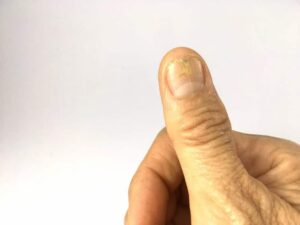
- Cracks or Splitting in Nails. If your nails are a healthy color, but you notice a lot of cracking or splitting and flaking, it may be a sign of thyroid problems or rheumatoid arthritis. If you see splitting and cracking in combination with yellowing, a fungal infection is the likely culprit.
- Pitting or Lesions in Fingernails. Tiny pits, indents, or lesions on the nails can indicate psoriasis or connective tissue disorders like osteoarthritis. Studies show that that nail pitting and lesions are one of the strongest signs that a person is developing psoriatic arthritis2.
- Clubbed Fingernails. The white part of your fingernail usually forms a slight half moon over your finger, coming to a stop where your fingernail connects with your finger on each side. “Clubbing” happens when the white part of the nail begins to curve all the way around the fingernail. It can be a warning sign of low blood oxygen, lung disease, cardiovascular disease, and even AIDS3.
- Fingernail Separation from Nail Bed. Sometimes called “Plummer’s nail,” nail separation can be a warning sign of thyroid or hormonal problems, as well as psoriasis. You’ll usually notice Plummer’s nail on your ring finger or pinky finger. Some people have noticed that Plummer’s nail also goes hand in hand with bacterial and yeast infections.
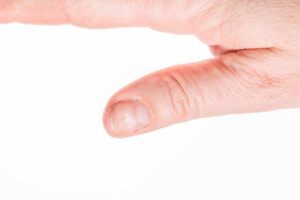
- Spoon Nails. If your nails start to look flat, concave, or “spooned out,” with the edges lifting up at the corners, it could be another sign of thyroid problems. Spoon nails can also mean heart disease, an iron deficiency, or an excess of iron.
- Pink Band at the Top of the Nail. If you notice a pink band running horizontally under the skin at the top of your nail, you may have Terry’s nails. In some cases, this symptom is just a normal part of aging. But it can also indicate liver disease, kidney failure, diabetes, or heart problems.
- Yellowish Discoloration in Fingernails. Yellowing nails are common. One possible cause is the regular use of nail polish; try soaking your nails in lemon juice for a few minutes to remove the residue from multiple manicures. If nail polish isn't the culprit, the yellowing can be an early warning sign of several conditions:
- Yellowing and Thickening: If you notice that your nails are becoming thicker and yellowish in color, it could be a sign of fluid in the lungs or respiratory problems like bronchitis.
- Yellowing and Spooning: If the yellowing happens along with splitting and spooning, it could also be a sign of hepatitis or liver cirrhosis.4
- Yellowing and Crumbling: If the yellowing happens along with flaking and crumbling, it may be a sign of a fungal infection, or more serious conditions like thyroid disease, lung disease, diabetes, or psoriasis.
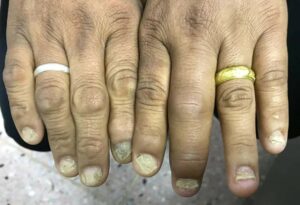
- Blue Fingernails. If your nails look more blue than pink, it might be a sign of oxygen deprivation, asthma, low hemoglobin, lung infection, pneumonia, or cardiovascular problems.
- Swelling and Redness Around Nails. If the area around the nail and fingertip is red, tender, or puffy, it could be a sign of infection, or more serious conditions, like lupus or connective tissue disorders.
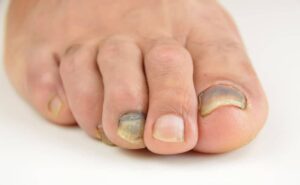
- Dark Lines Under the Nail. If you notice a dark or black band running under your fingernail (that isn’t the result of an injury or trauma to the nail), it’s important that you see a doctor immediately. This dark band can be a sign of melanoma skin cancer called subungual melanoma.
- Splintering Red Lines in Fingernails. Tiny red lines may appear as a result of an injury. However, if they appear seemingly out of thin air, these thin red or brownish lines under the nails can be a sign of heart valve infection or vasculitis.
- Very Pale Color Nails. Healthy nails should be transparent where they connect with the nail bed and white as they grow over the top of your finger. If your nails become very pale in color instead of white at the top, you might have a nutritional deficiency, heart disease, or anemia.
- White or Black Nails. If your nail is turning white all over (not just at the tips) or blackish, it may be a sign of liver problems, jaundice, or even hepatitis in some cases.
How to Improve the Health of Your Fingernails (and Body!)
Healthy body, healthy fingernails. It’s almost always that simple.
There are plenty of “fingernail hardeners” or dietary supplements made just for fingernails. But thinking bigger picture--and addressing the underlying health issues your nails point toward--is the best way to both healthy fingernails and whole-body health.
Some conditions that cause unhealthy fingernails require their own treatment plan (like hepatitis). However, many health issues (and fingernail issues) can be resolved just by taking better care of your body.
1. Eat a Whole Foods, High-Raw, Organic Diet
So many of the health problems we deal with in modern society can be traced to sugar and other processed foods--and a lack of nutrient-dense food. Our bodies simply weren’t meant to eat refined sugar, white flour, and added chemicals, especially in the quantities many of us consume it.
Sugar and white flour products cause yeast overgrowth and wreak havoc on your gut (which keeps you from absorbing and using minerals and nutrients properly).
On the flip side, you’ve got to replace all those empty, toxic calories with greens, vegetables, fruits, legumes, whole grains, and nuts and seeds. Add more whole foods to your diet, more plant foods, especially more raw (uncooked) plant foods. Your digestive system was built to process mostly raw, mostly plant food. Give it what it wants!
You can learn more about the process of reversing early signs of toxicity and illness, in my free video masterclass about how to optimize human detoxification.
You can also learn about how I reversed 21 diseases, got off 5 prescription medications, and lost 70 pounds without dieting, shifting to a whole foods diet, in this free video masterclass.
2. Heal Your Gut with Probiotics and Enzymes
If you want a healthy body (and healthy nails), the best place to start is your gut.
The millions of bacteria that live in your gut form a “microbiome” that plays a huge role in whether or not you get sick, fight off disease, or even feel mentally healthy and stable. And the enzymes (or lack thereof) in your gut mean the difference whether or not you can absorb and actually use vital nutrients and minerals.
If your microbiome is out of balance, the problems you might deal with are endless, including leaky gut. Supplementing with probiotics and enzymes are two of the best ways to heal and balance your gut, and make sure you’re able to actually use the minerals and nutrients you eat.
3. Get Your Omega-3s
A deficiency in fatty acids will show up in weak, unhealthy nails. Just like a deficiency in fatty acids will show up in an unhealthy, disease-prone body.
Don’t just reach for the fish oils for your Omega-3, though. Not only is plant-based Omega-3 free from contamination like mercury, but it’s more sustainable and more bioavailable. Sprouted flax, chia, and broccoli seeds are the absolute best, most bioavailable plant source of Omega-3.
4. Replenish Vital Minerals and Nutrients
Healthy nails (and a healthy body) require plenty of iron, zinc, calcium, and other vital minerals. But nearly everyone living in North America is mineral-deficient. This comes as no surprise, given the chemical-intensive environment we live in, which uses up minerals faster than we can consume them.
We have access to plenty of mineral-rich foods and supplements, but few of them are well-absorbed by the human body (in other words, bioavailable).
Humic acids and fulvic acids, from deep inside the earth, are the very best way to get your vital nutrients and minerals--especially trace minerals.
The highly concentrated fulvic and humic acids are easily recognized and used by the body, in a way that even many fruits and vegetables are not (when they come from the mineral-depleted soil of North America, anyway).
Just add a dropperful of humic/fulvic concentrate in your water, first thing in the morning, and last thing at night, which is when you’re most mineral-depleted, and when your neurological system will benefit quickly from these 90+ nutrients, for falling asleep quickly at night, and waking up quickly to be productive and clear-minded, in the morning.
Your fingernails are just one tiny part of your body, but they can be important signals of your overall health. Healthy body, healthy fingernails--and vice versa!
Read next: Is all nail polish toxic? Check out what I learned after getting “gel toes” at the salon!

Disclosure: This post may contain affiliate links that help support the GSG mission without costing you extra. I recommend only companies and products that I use myself.
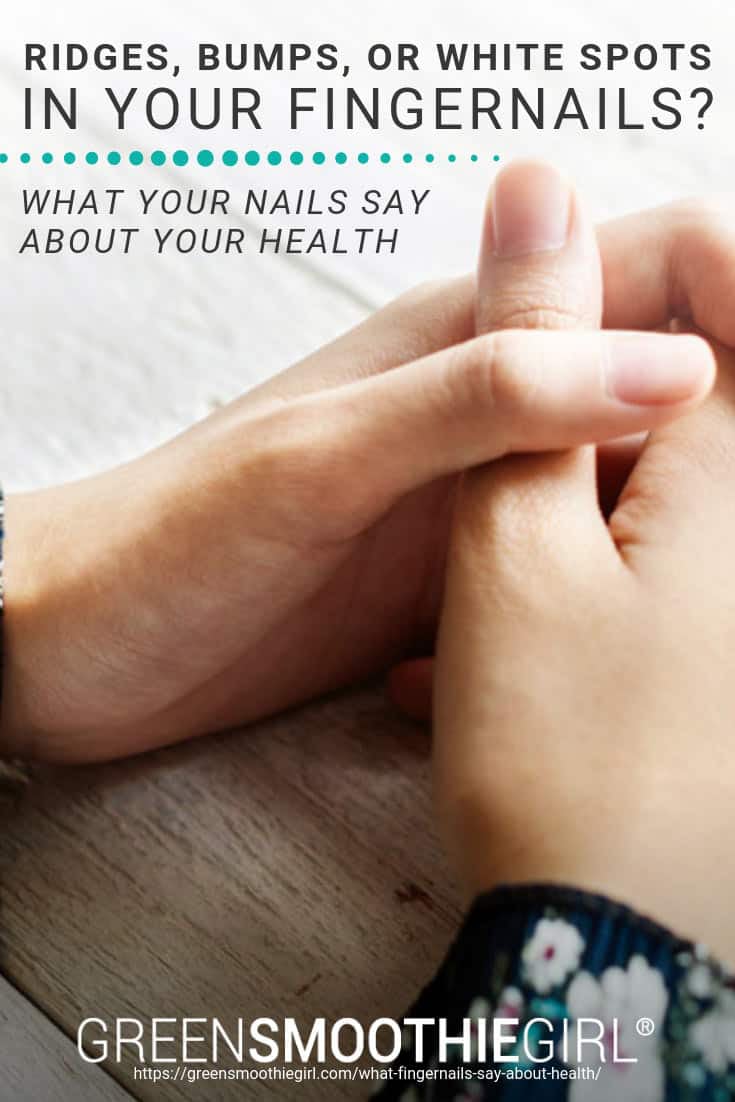
Resources
- Park J; Li K (2010). "Multiple Beau's lines". New England Journal of Medicine. 362 (20): e63. doi:10.1056/NEJMicm0906698.
- Sobolewski P, Walecka I, Dopytalska K. Nail involvement in psoriatic arthritis. Reumatologia. 2017;55(3):131-135. doi:10.5114/reum.2017.68912.
- Sarkar M, Mahesh DM, Madabhavi I. Digital clubbing. Lung India : Official Organ of Indian Chest Society. 2012;29(4):354-362. doi:10.4103/0970-2113.102824.
- A. Salem, H. Gamil, M. Hamed, S. Galal. Nail changes in patients with liver disease. J Eur Acad Dermatol Venereol. 2010 Jun; 24(6): 649–654. Published online 2009 Nov 2. doi: 10.1111/j.1468-3083.2009.03476.x
Posted in: 12 Steps To Whole Food, Detox, Health Concerns, Supplements, Whole Food











